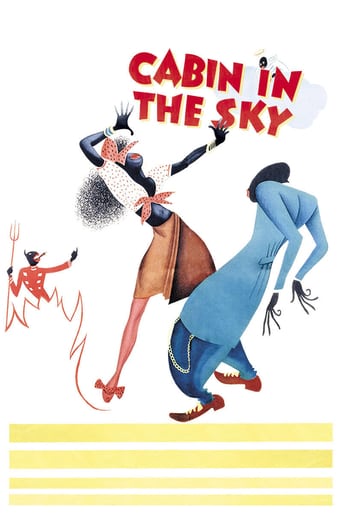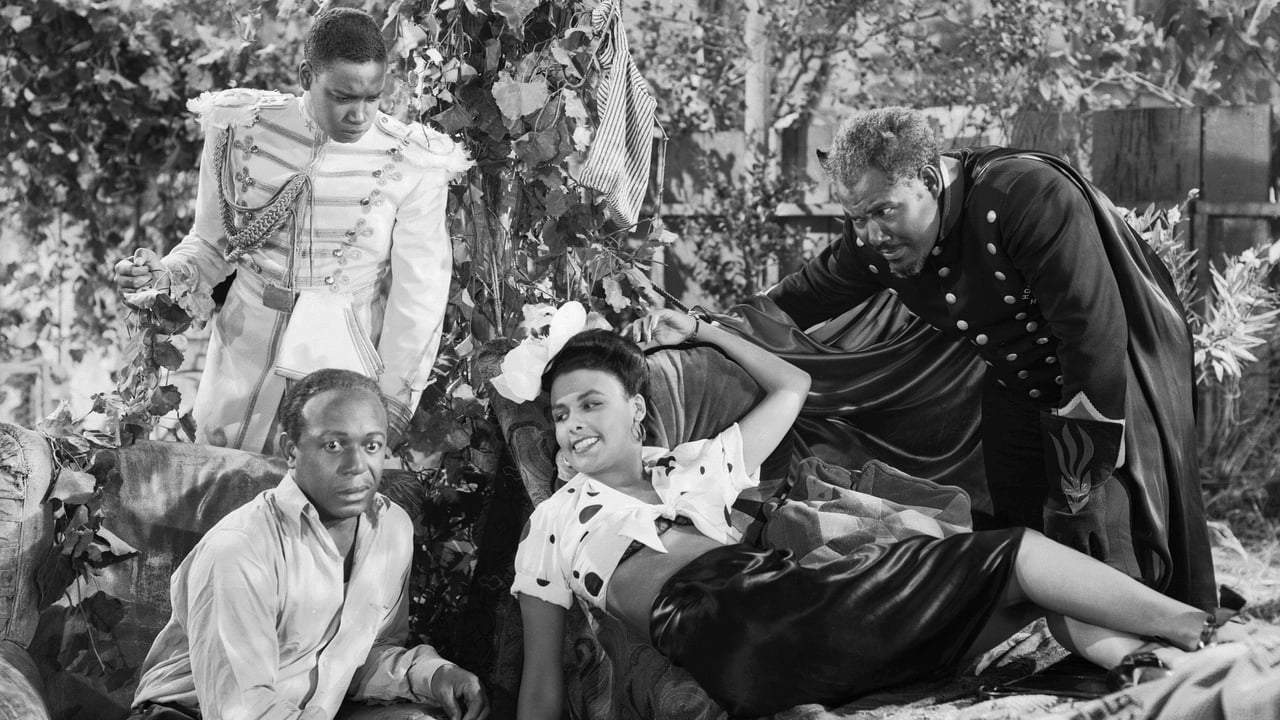clanciai
Fireworks of imagination in an intoxicating phantasmagoria of splendid innovations, Lena Horne and Duke Ellington crowning the show both musically and dramatically - the grand scene at John Henry's bar transcends most musicals in sheer flippant enthusiasm. The story is a kind of mental experiment, playing with life and death, and the gamble is high as you don't really know which is which. Rex Ingram is marvellous as Lucifer Junior, laughing his sides off throughout the picture, and the musical numbers are the real treats, especially the church scene in the beginning apart from the grand finale at the bar. The dialogue is ingenious throughout, and just to follow the witty argument makes it worth returning to the film to study it more in detail - there are so many fantastic details to catch up on the way, as the film practically is overloaded with splendid whims, and while it's all too realistic in its drama of life and death, it's at the same time like a fairy tale or parable, from which you can learn a great deal. This was only one out of many films by Vincente Minnelli over-proving that he was a genius.
palmiro
Once upon a time the colored folks were all smiles and jolly. Well, not really but what the hell, even if a caricature it was a reflection of a part, if only a part, of their reality. (Most objectionable to me was the religiosity bordering on crude superstition--but there too you gotta go with the fantasy side of this thing.) We laughed a lot and really got a kick out of the songs and singing (especially the great renditions given by Ethel Waters-- who even did a jitterbug number), as well as the over-the- top acting by "Rochester" and Rex Ingram.Offensive to Black folks today? Sure, if they are totally invested in "presentism" (condemning people of the past with the standards of behavior we hold today). What would they want? To see more Black characters with a Ph.D. in hand? The manner of speech and social conditions in the movie depicted the life of the bulk of the Black masses at the time. What's missing, of course, is the presence of Whites and signs of the oppressive power exercised by Whites over them--not a single White person to be seen anywhere. This is, after all, a comedic fantasy--a Black fantasy that perhaps expressed a not-so-repressed vision of paradise for Blacks, in which they would be free of White folks and be able to sort out their lives by themselves and for themselves.
edwagreen
Absolutely, a superb motion picture of 1943. Ethel Waters is an absolute standout as the devoted wife, a Lord fearing woman who will go to any extreme to save her husband, Eddie Rochester Anderson, a compulsive gambler winding up dead and given a second chance to redeem himself.Waters throws herself into the part of Petunia, his loving, faithful wife. Her rendition of Happiness is Just A Thing Called Joe was forever endearing. Remember the way Susan Hayward sang that song in 1955's "I'll Cry Tomorrow?" I now realize that Hayward was emulating Ms. Waters when she belted out that song in that magnificent film.This was certainly a great opportunity for Anderson, the sidekick of Jack Benny on radio and television for so many years and he makes the most out of it.The way the dream sequence was done was phenomenal and with an outstanding supporting cast, this picture was just marvelous. Lena Horne, as the devil's worker, was also fantastic.
theowinthrop
Let's call it a deserved "10" but with a sense of trouble for one's conscience.In 1943 it was nearly impossible to consider any film with a predominantly African-American cast as serious by most Americans of Caucasian or non-African-American backgrounds. Typical fare from Hollywood was a series of stereotypes, usually for comic purposes. However there had been a few films that (even with the stereotypes) suggested more was there. King Vidor's HALLELUJAH in 1929 dealt with African-American revivalism. Two Broadway hits, O'Neill's THE EMPEROR JONES (with star Paul Robeson recreating the role of Brutus Jones) and THE GREEN PASTURES had been done with mostly African-American casts (Dudley Digges did play a critically important role in THE EMPEROR JONES, but he was an exception). The 1929 and 1936 versions of SHOW BOAT did deal with the "Jim Crow" south, and the issue of racially mixed marriages. The film of Fanny Hurst's novel IMITATION OF LIFE (1933) dealt with a young woman trying to pass for white and breaking her mother's heart as a result. GONE WITH THE WIND passed on the myths of how happy the slaves were in the South, but Hattie McDaniel's performance of "Mammy" was vivid and strong, and won the first Oscar for an African-American performer. Finally, in 1942, John Huston's film, IN THIS OUR LIFE, dared to suggest that a young African-American man could try to study law to enter the legal profession.When Vincent Minelli was assigned to do the MGM musical version of CABIN IN THE SKY, most insiders thought that it would be a flop. Minelli had never directed a film before, and was an unknown quantity in Hollywood's talent market. Actually he was a good choice - he was a veteran of Broadway musical productions, and was just the right person to work on a film based on a Broadway musical. It was his first film, and proved to be a great success.It think it is due in part to his determination to show what he could bring out of the musical, and also the equal determination of the cast, led by Ethel Waters (who played the lead "Petunia" on Broadway), Eddie Anderson ("Joe"), Lena Horne (as temptress "Georgia Brown"), John Bubbles ("Domino Johnson"), Kenneth Spencer ("The General/ Rev. Greene"), and Rex Ingram ("Lucifer Jr."). Other familiar faces crop up like Willie Best, Mantan Morland, Oscar Polk, Butterfly McQueen, Louis Armstrong (oddly wasted in a mostly comic speaking role), and Duke Ellington and his orchestra. It's hard to imagine this but this film effort had the cream of Hollywood's available African-American performers in it. And they wanted to show what they could do.The story is about the devotion of Petunia to her husband Little Joe, who is weak and constantly gambling. But he hopes to win a fortune to give Petunia the things she always wanted. Unfortunately he is also infatuated with Georgia, a sexy singer at the gambling house/night club he heads for. One night (while supposedly seeking forgiveness for his sins at church) Joe is lured to the nightclub into a dice game, and is shot by Domino. He is treated at home and the film goes from this point to it's conclusion with a battle between God's messenger, "the General" (always wearing white uniforms), and "Lucifer Jr." and his minions. Due to a technicality Joe is not to die, but is given six months more to show his wife's devotion is strong enough to put him permanently on the good and narrow path. Lucifer Jr. and his associates (including Morland, Armstrong, and Best) are determined to show Joe cannot change.The cast shows what they could do. Waters in particular has two songs that became standards: "Happiness is a Guy named Joe", by Harold Arlin and Y.I.P. Harburg, and "Taking a Chance On Love" by Vernon Duke from the original score. But Horne is allowed to sing as well (though one number was cut here but transposed elsewhere). Bubbles does his great dance and song act in the latter part of the film, in the number "Shine". Even Anderson (best recalled for being Jack Benny's foil as "Rochester") demonstrates singing in a duet with Horne, and dance in a number with Waters.I suppose my favorite though is Ingram. He's now the forgotten man in African-American film history, because he never had the degree of public attention that Paul Robeson received. But he appeared in the lead as "De Lawd" in the movie version of THE GREEN PASTURES, as "Lucifer Jr." here, as the genie in the Alexander Korda epic THE THIEF OF BAGHDAD (1941), and graced other films as well (as the gentle valet to Ronald Colman in THE TALK OF THE TOWN, where he starts crying at his boss's insistence at shaving off his distinguished goatee). Ingram, I feel, could play any kind of part. Given the paucity of good lead parts in his day, that he got three of them shows Hollywood and British producers thought well of him. Here he does not sing (I suspect he did not have the voice) but he is enjoying his wickedness throughout. He also has one of the best lines in the film - complaining of the lack of good ideas (in getting Joe's soul): he says that it's because the best idea men in Hell are currently in Europe (this being the fourth year of World War II). The film is actually quite entertaining to this day - although the stereotypes of crap shooting African-Americans is unsettling. But think of this point: this is the first film I know of from Hollywood where a black professional is shown who is not a minister! When Eddie Anderson is treated for his gunshot wound, the physician is black, and is not a stereotype.



 AD
AD




